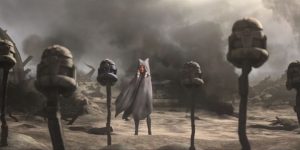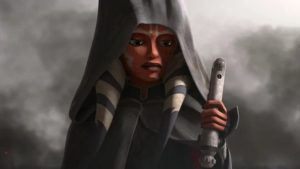SPOILERS FOR THE BAD BATCH AHEAD!
I’m gonna be honest, the Bad Batch didn’t make much of an impression on me when they debuted in The Clone Wars‘ final season just last year. The concept – an elite team of genetically-defective clones whose individual mutations give them special abilities – was admittedly quite intriguing, but the execution was only okay, never elevating the material. And despite their uniqueness being so crucial to their very existence, there wasn’t ever enough time in that season to clearly distinguish their character arcs; only their physical appearances, skills, and a handful of archetypal traits.
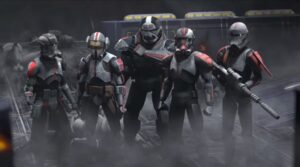
But now the Bad Batch have an entire sixteen-episode series in which to extensively explore both their team dynamic and individual storylines; and the series’ premiere event (which clocks in at 71 minutes, longer than any episode of The Mandalorian, or even Marvel’s Disney+ originals) sets an appropriately dark and sophisticated tone for that journey, much like the final season of The Clone Wars. The first episode dives into the fascinating question of what happened to the Old Republic’s clone armies after they had played their part in initiating Order 66: mindlessly slaughtering the Jedi and clearing a path for Emperor Palpatine (Ian McDiarmid) to conquer the galaxy.
While most Star Wars media has looked at Order 66 from the perspective of the Jedi who survived it and went into hiding, The Bad Batch picks up with the clones themselves, who have nowhere to hide from the shame and guilt of what they’re slowly beginning to realize was the entire purpose for their existence all along. The Bad Batch themselves didn’t even kill any Jedi – the inhibitor chips planted in their brains are faulty, giving them their unique personalities and casual disregard for orders – but they won’t turn their backs on other clones: especially not the one member of their team unit, Crosshair (voiced, like all clones, by Dee Bradley Baker), whose inhibitor chip is still working strongly enough to give him internal conflict as he fights between his programming and what he knows to be right.
Star Wars loves inflicting an undue amount of pain and grief on its fans, so it’s no surprise that The Bad Batch opens by once again reliving Order 66 – but what did surprise me was that we finally get to see the death of the Jedi Depa Billaba (Archie Panjabi), and the fateful moment at which she told her young padawan, Caleb Dume (Freddie Prinze Jr.) to flee before the clones could kill him too, burdening him with years of guilt and setting him on the path to become the rogue knight Kanan Jarrus, whom we would later meet in Star Wars: Rebels. Is it slightly distracting that Dume – a young teen at this point in the timeline – has an adult man’s voice? Maybe, but Prinze Jr. is iconic and frankly irreplaceable in this role.
What Jarrus left out of his tragic backstory was that the Bad Batch were witnesses to this horrific moment, and that it was the team’s commander, Hunter, who allowed him to escape even though Crosshair was prepared to kill the young Jedi. Much of the episode’s first half revolves around this decision and its ramifications, including the wedge it drives between Hunter and Crosshair – eventually leading the sharpshooter to betray the team and join forces with Admiral Tarkin (Stephen Stanton).
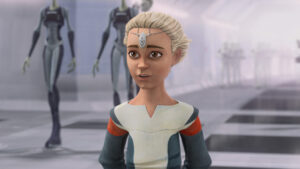
But even with Tarkin and Dume’s cameos, the episode feels like it’s kicking off a fresh and unique story that will organically weave these and other cameos into the narrative (whereas The Mandalorian simply shoehorned them in wherever possible), while keeping the focus on our core cast of characters. The Bad Batch, thankfully, are all pretty interesting once you get to know a little bit more about them: I particularly adore Wrecker, the team’s big scary muscly sweetheart, and Tech, who’s an endearingly snarky know-it-all. Echo is the only member who still feels in need of a personality boost, but his character was originally a regular clone before joining the Batch, so that’s not entirely surprising.
The team also gains a new member in this episode – a young girl (voiced by Michelle Ang) with an adventurous streak, whose backstory is still something of a mystery. Ominously named Omega, she comes from the cloning facilities of Kamino, where she works as a medical assistant to the Kaminoan doctor Nala Se (Gwendoline Yeo), but the episode doesn’t take long to confirm that she is in fact another defective clone. Since all clones are assigned male at birth, Omega’s gender identity is pretty significant – although I’m wary of concluding from this that she’s meant to be a trans character, as some fans have been saying. Unfortunately, I feel her distinctive white-blonde hair and possible Force-sensitivity give away that she’s more likely an early prototype of a Palpatine clone.
But even if that is the case, I like her character a lot – and her wide-eyed reaction to traveling through hyperspace for the first time made the simple plot device feel magical again after nine movies. Hopefully she survives through The Bad Batch, and doesn’t transform into Snoke from the sequel trilogy or something like that, but I genuinely won’t be surprised if her character is meant to explain away some of the plot-holes in The Rise Of Skywalker.
I want to believe that the show is too sophisticated to go down that route, however, because in other regards it displays the same level of subtlety and thematic cohesion found in most of Dave Filoni’s animated projects. On that note, The Bad Batch can certainly be enjoyed by both adults and kids, but the premiere’s longer runtime combined with its darker, more contemplative tone may cause the audience to skew a little older. The action scenes are fun and lively (teamwork is always cool, especially when it involves characters cleverly building off each other’s strengths), but there’s not a lot of fighting in this particular episode.
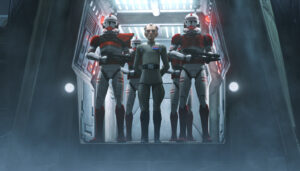
Considering that I went into The Bad Batch expecting to be bored out of my mind by characters who I hadn’t really liked when they first showed up, I regard all of this as a huge win – and I’m excited to see where the series goes from here. I’m not sure if it’ll be my next obsession like Rebels was, but I will continue to review it because I like Star Wars, even when it seems purposefully designed to cause me emotional distress.
Episode Rating: 8/10

